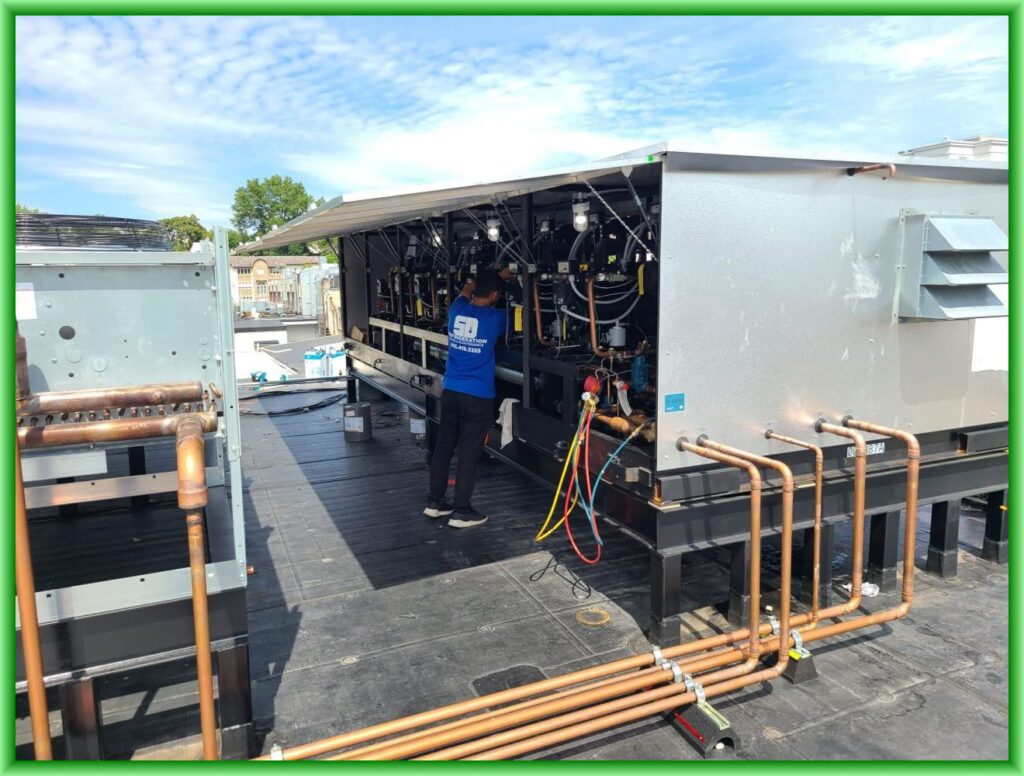Grocery Store Commissioning
Grocery Store Commissioning
This article discusses the California code requirements for grocery store commissioning. In addition we discuss some of the problems that commissioning creates for new grocery stores. Lastly, we offer some suggestions as to how to minimize store opening delays that are frequently caused by commissioning.
The California Green Building Standards Code, aka CalGreen, requires commissioning on all new nonresidential buildings over 10,000 square feet. The California Energy Code, as well, also has additional commissioning requirements for supermarkets and grocery stores. Most new supermarkets in California fall into these requirements due to their size.
However, there seems to be a significant misunderstanding by design professionals as to the actual scope of the California Code commissioning requirements.
The California Green Building Standards Code and the California Energy Code specifically limit the building systems that must be commissioned. Further, the scope of the commissioning effort is far less involved, and less costly, than the national standard type commissioning process.
Under California code, refrigeration systems are considered “process systems”. Process systems are specifically excluded from the commissioning requirements of the California Building Code. For this reason, it is logical to separate this effort from the code-required commissioning.

What Is California Code Commissioning?
Commissioning is the process of planning, documenting, scheduling, testing, adjusting, verifying, and training, to provide a facility that operates as a fully functional system per the owner’s requirements and in accordance with the design. While a project’s design professionals and installing contractors are ultimately responsible for the quality of the installation, commissioning coordinators provide a second set of eyes and ears to catch any deficiencies and resolve issues prior to building occupancy.
Since the California Energy Commission is the controlling organization for both the CalGreen and Energy Codes, the commissioning effort is intended to be handled as a single process. Two separate commissioning efforts are not required, even though both codes contain similar requirements.
When the California Energy Commission (CEC) decided to add commissioning to the codes it understood that it needed a less expensive process than the national standards. For this reason it did not adopt LEED or the AABC process into the code. While these organizations can bring value to complex projects, they require extensive onsite observation and testing that is hard to justify on smaller, less complex projects.
The CEC also took into consideration is that large projects with central energy management software typically specify commissioning due to the complex nature of the systems. The CEC’s goal was to introduce a beneficial level of commissioning to smaller projects.
The California Energy Commission wanted to provide a reasonable level of commissioning without the cost burden of the national standards. As a result, they created the specific, and limited, commissioning requirements that are detailed in both the CalGreen Code and the Energy Code.

What Is Unique About Grocery Store Commissioning?
Grocery stores and supermarkets provide a unique challenge when it comes to commissioning in California.
Frequently supermarkets have standard commercial level HVAC systems. Exterior and interior lighting is designed to meet the minimum requirements of the Energy Code. As such, the major HVAC & Electrical systems don’t always require an advanced level of commissioning. Yet these systems are frequently included in the costly and time-consuming effort of a national standard commissioning process.
In a perfect construction world where time, money, and store opening dates were flexible, full commissioning of all building systems might provide some small benefit to the business.
However, the reality of permitting delays, design changes, weather delays, and other factors rarely leave any extra time for the commissioning effort at the end of the project. For this reason, limiting the scope of the commissioning effort can be beneficial to the primary goal of beneficial occupancy.
One key issue with grocery store openings is product delivery. A grocery store must absolutely open on schedule due to the delivery of products that are scheduled months in advance. When refrigerated product can run into the millions of dollars, having last minute delays due to commissioning simply cannot happen.
In addition, every day a grocery is held up from opening can cost hundreds of thousands of dollars in lost sales. Changes to employee schedules, marketing materials, vendors, and contracts with internal partner business’s can create further losses.
The bottom line is that the beneficial occupancy of a grocery store or supermarket is one of the most critical dates in the construction industry. Anything that can be done to ensure the store can open on time must be done. Simplifying the commissioning effort can eliminate one of the potential road blocks.
Simplifying Grocery Store Commissioning
Rather than perform full-blown commissioning on all the supermarket systems, time and money can be saved by a hybrid approach.
The hybrid approach involves meeting the minimum requirements of the California Code for the HVAC, electrical, domestic hot water, and landscape systems. These systems are simple, self-monitoring (in most cases), and do not require an extensive commissioning effort.
The second part of the hybrid approach is to fully commission only the complex refrigeration systems by hiring a specialty refrigeration consultant/contractor.
It’s a fact that few HVAC engineers are highly skilled in refrigeration system design. Can you really trust them to write a proper commissioning specification? If you’ve been in the industry a while, you will know the answer to this.
Grocery store and supermarket refrigeration systems have become complex and represent a significant risk if failures occur. In addition, the energy costs to run these systems will likely be one of your greatest energy costs. For these reasons engaging a refrigeration specialist to commission this critical piece of infrastructure makes economic sense.
Since commissioning of refrigeration systems is not required by California code, it makes perfect sense to disconnect it from the permit process entirely. This allows the refrigeration system commissioning process to be scheduled and performed without any interference from code officials.
In addition, by implementing the hybrid approach the project spends minimal time and capital on commissioning the basic, non-critical, building systems.
The hybrid approach to commissioning can help ensure your grocery store is ready to open on time, and possibly, on budget. Ok, one out of two isn’t bad… %^)
At CalGreen Energy Services we can save your grocery store time and money on your commissioning effort. We can provide the economical code-required commissioning, while your refrigeration specialist handles the critical product refrigeration needs. Let us help you coordinate this today. We are happy to talk to you about your project!
Call us today and let us show you how we can help with your project.
Email: gary@calgreenenergyservices.com
Phone: 707-328-5299


Gary Welch has over 35 years experience in the field of sustainable building design. He is the CEO of CalGreen Energy Services. Gary is an ICC Certified CalGreen Special Inspector and Plans Examiner.



